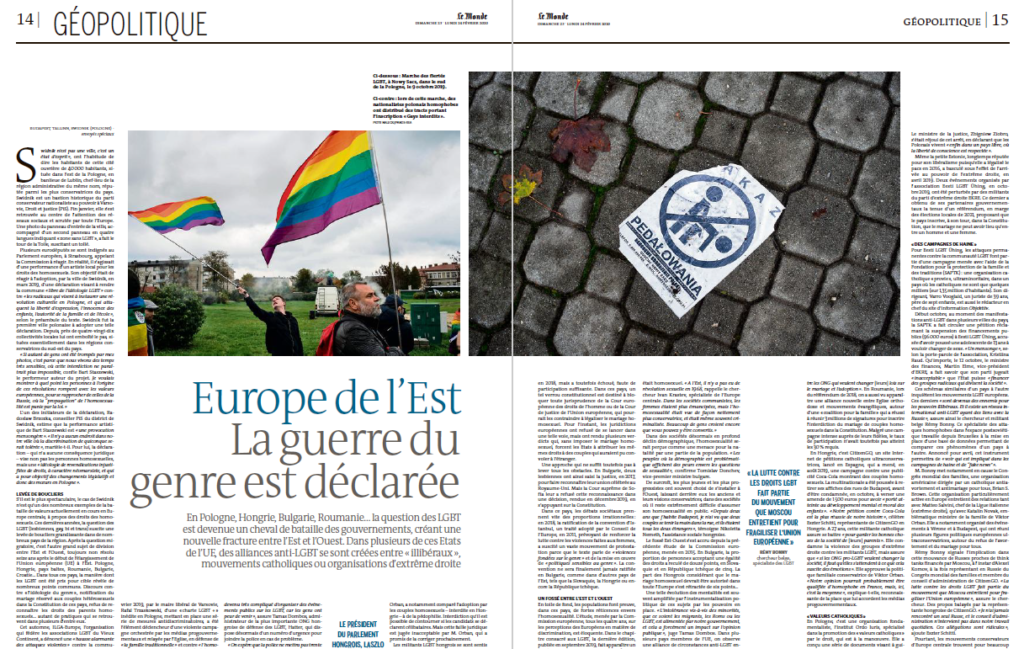The lack of sympathy for gender ideology and the LGBT+ agenda in Eastern European countries is well known since 2018, thanks to research carried out by the Pew Research Center. The research highlights two factors: the widespread religiosity of the people and the (less obvious but nonetheless real) perception that these kind of “civil rights” seek to impose a new ideology, as totalitarian as the Communist ideology of the past. The research shows that, while “majorities in all Western European countries agree with same-sex marriage, majorities in almost all Central and Eastern European countries oppose it.” For example, 88% of adults in Sweden and 75% in Germany say that they are “[…] strongly in favour of the legalisation of gay and lesbian marriage,” whereas “74% of Romanians and 79% of Bulgarians strongly oppose or oppose it.”
Another study by the Pew Research Center in 2019 shows that the majority of adults in the 15 Western European countries surveyed as early as 2017 were in favor of same-sex “marriage,” with about six in ten Italians and three-quarters of Swiss expressing favor. The figure was even higher in Sweden (88%), Denmark (86%) and the Netherlands (86%). In contrast, the peoples of Central and Eastern Europe were largely opposed. Just 5% of Russians and 9% of Ukrainians, for example, “say that they are in favor of same-sex marriage, according to surveys conducted in 2015 and 2016. Poland’s (32%) and Hungary’s (27%) figures are higher but Poles and Hungarians in favour of same-sex marriage remain in the minority. The Czech Republic is the only one of the 19 countries monitored in Central and Eastern Europe where the majority of adults (65%) [support] gay marriage.”
The “illiberals”
Now, recently, the well-known French newspaper Le Monde published a report on what it calls the “war on gender” declared by the East: that is, this refusal by Central and Eastern European countries to accept LGTB ideology, which Le Monde credits to Catholic movements, right-wing political extremism and “external agents.” But that’s not the case: movements and political parties may try to ride the wave of dissent that is growing in these Eastern countries, but they are not its origin.
At those latitudes, opposition to gender ideology and new “LGBT+ rights” is the only possible reaction for peoples who have suffered 60 years of Communist rule and, despite this, kept alive the roots of Christian, Catholic or Orthodox faith. The imposition of the new ideology and “new rights” provokes a reaction: Europe and the West, which in the 1990s were perceived as protagonists of liberation from Communism, now appear as oppressors. As a result, anti-Europeanism is growing. Le Monde’s statements, therefore, that in Poland, Hungary, Bulgaria, Romania and elsewhere in the East is “[…] the issue of LGBT people has become a workhorse of governments,” and that “in many of these EU countries anti-LGBT alliances have been formed between ‘illiberals’, Catholic movements or far-right organizations,” is simply incorrect.
The “Catholic fascists”
It is also false to claim, as the French newspaper does, that there are foreign “agents” that foment hatred, among them CitizenGo (a platform that promotes international petitions), the World Congress of Families (WCF), the International Organization for the Family (IOF, the publisher of iFamNews). A simple proof of the gratuitous falsity of Le Monde‘s claims? They define Alexey Komov—a WCF and CitizenGo board member—as an influential promoter of the Russian project of undermining Europe, implemented through battles against LGBT+ ideology, which is about as far from the truth as the moon is from earth. What about the former German Social Democratic chancellor Gerhard Schroder, a staunch promoter of “LGBT+ rights” and now head of the Nord Stream AG consortium (which deals with the pipeline that will connect the Russian coast to the German coast via the Baltic Sea) being appointed by the Russian gas giant Gazprom? Is it to be concluded that Komov is more powerful than Schroder, or that Schroder better represents Russian interests, far removed from ideological battles?
Furthermore there is the historic animosity between Poles and Russians: never, on any subject, nor in any cultural battle, do these factions seem allied. The majority Christianity in the four countries mentioned is also constituted by differing stripes of Christianity: between the Bulgarian and Romanian Orthodox Churches on the one hand and the Polish Latin Catholic Church on the other hand there is no relationship. And in a similar way there is no relationship between the thousands of petitions that CitizenGo publishes (every day, in every part of the world( and the initiatives of the Estonian Conservative Popular Party (EKRE) as Le Monde alleges.
As for IOF? This organization, which promotes natural marriage and the family, cannot be suspected of any hate speech, nor is it credible to suspect IOF simply for organising events in Hungary and Italy. If, on the other hand, the purpose of Le Monde‘s report was to claim that Catholics are fascists and that the “Catholic fascists” of Eastern Europe promote hatred and racism, then this is simply unfair, wrong and offensive. Promoting censorship in Europe and discriminating against anyone who believes in, promotes and defends human nature, marriage, and the natural family is unacceptable, discriminatory and totally uncivilized.
